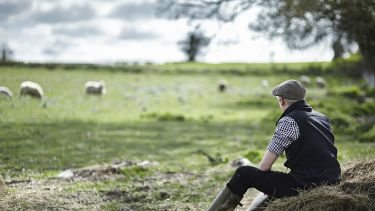- New research reveals farmers already at tipping point due to regulatory uncertainty and isolation
- Formal and informal support networks disappeared during lockdowns
- Research calls for roll-out of mental health first aid training for variety of supporters involved in agriculture
Farmers’ mental health is at a tipping point, despite already being critical prior to Covid-19, which widened existing cracks in support according to new research.
Researchers from the Universities of Sheffield, Reading and Exeter found that while Covid-19 led to worsening mental health among farmers, those surveyed said that they were already struggling prior to the pandemic.
Incoming changes to the basic payment system to support farmers following Brexit were a major factor for worsening mental health, alongside heightening issues such as isolation, bureaucracy, and climatic conditions.
MPs, agricultural leaders and academics heard today about results from the Landscapes of Support for Farming Mental Health project, which was funded by the Economic and Social Research Council (ESRC) in response to the global pandemic and the impact it had on farmers.
Dr Ruth Little, Lecturer in Human Geography and member of the Institute for Sustainable Food at the University of Sheffield, said:
“In addition to Covid-19, post-Brexit policy uncertainty weighs heavily on the minds of farmers and their families - it has created a ‘perfect storm’ in terms of fuelling stress and anxiety. This project points to important evidence on both the need for support mechanisms to be in place and indicates ways to ensure that this support is effective, well-funded and as joined up as possible.”
Neil Parish MP, Chair or the Environment, Food and Rural Affairs Select Committee who attended the presentation of the research said:
“I’m glad to be attending this workshop tackling mental health issues in rural communities. Farmers and others in these communities often face stress caused by isolation, insecure incomes and unpredictable weather.
“My parliamentary committee has launched an inquiry into rural mental health and I’m hoping we’ll learn valuable lessons from the ‘Landscapes’ project.
“Expert research into this issue from the ’Landscapes’ team and others will help inform the recommendations we’ll eventually make to the Government about how its support to rural communities on mental health matters can be improved.”
Dr David Rose, Elizabeth Creak Associate Professor of Agricultural Innovation and Extension at the University of Reading who led the research, said: “Like many people in society, Covid-19 had a profound effect on the agricultural community, but one of the biggest impacts was to widen the already existing cracks between farmers and their support networks, and exacerbated the poor mental health that many farmers were already experiencing.
“Covid itself was just the tip of the iceberg. Against the backdrop of huge regulatory change, the first wave of the global pandemic was especially hard on farmers with the driest spring on record, the removal of formal and informal support networks and major shifts in patterns of consumption and demand.”
Charities, trade and governmental bodies normally play an important role in supporting agricultural communities, but the research highlights how usual touch points for those services and informal help were unavailable.
During the presentation, the research team identified how the wide range of formal and informal sources of support are usually available for farmers. They noted that formal support channels are often signposted by peers, friends, and roles such as vets or merchants.
Charities and organisations that support farmer welfare suffered major loss of income and affected services like many in the third sector. The team also found that the unique context that farmers and families who often live in isolated, rural communities face, contributed to mental health stressors.
Due to particular demands that rural agricultural communities face, the researchers recommend that mental health first aiders are urgently trained to provide signposting and support for farmers. Furthermore, the shift to online provision for many support services and charities makes the digital divide on broadband access more urgent to ensure that provision can reach farmers, their families and supporters.
Contact
For further information please contact:

